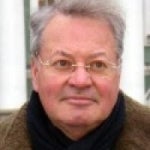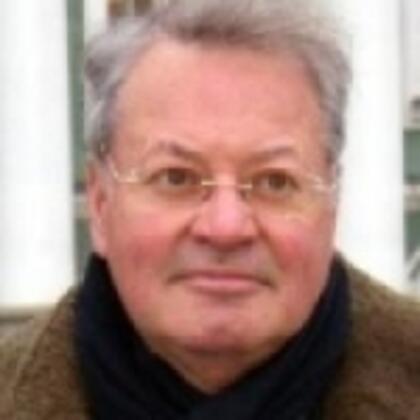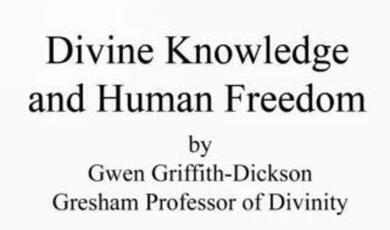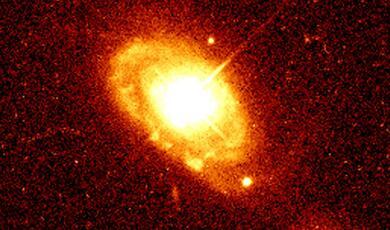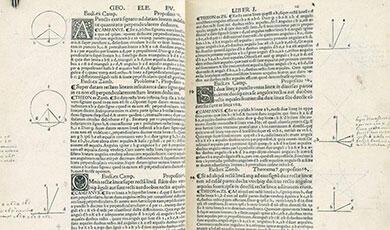The Boyle Lecture: The Legacy of Robert Boyle - then and now
Share
- Details
- Text
- Audio
- Downloads
- Extra Reading
The revival of the Boyle Lectures in recent years has focused attention, as Boyle would have wished, on the relations between a culture of science and the plausibility of religious claims. Much of course has changed since Boyle in his Will endowed the original lecture series, but there remain certain parallels between his own time and ours. In the Preface to his book The Christian Virtuoso, Boyle observed the 'great and deplorable growth of irreligion, especially among those that aspired to pass for wits and several of them too for philosophers.' On the other side were their opponents, who by virtue of 'well-meaning but ill-informed zeal, had brought many good men to think that religion and philosophy were incompatible.'
The consequence, in Boyle's words, was that libertines thought a scientific virtuoso ought not to be a Christian and the others that he could not be a true one. My intention in this lecture is to introduce and revisit Boyle himself, who sought to mend this situation. Known to many only as the originator of a 'law' governing the behaviour of gases, Boyle repays closer study as one who thought deeply about the meaning of the word 'nature' and the reality of a spirit world.
I shall suggest that while many of the assumptions underpinning his natural theology would have to be regarded as obsolete, some of his arguments for the compatibility of theism with the sciences had a depth that enabled them to survive in subsequent religious rhetoric. After noting the longevity and diversity of appeals to 'design' in nature, I shall consider what remains valuable in Boyle's legacy today.
This is the 2010 Boyle Lecture. Other Boyle Lectures available include the following:
The 2011 Boyle Lecture
Misusing Darwin: The Materialist Conspiracy in Evolutionary Biology
Psychologising and Neurologising about Religion
Cosmology of Ultimate Concern
Download Text
THE BOYLE LECTURE 2010 "The Legacy of Robert Boyle - Then and Now"
Lecturer: John Hedley Brooke
Responder: Geoffrey Cantor
Robert Boyle 1627 - 1691
In a well known study of the 'scientific revolution' of the seventeenth century, Stephen Shapin pointed to an interesting paradox: 'The more a body of knowledge is understood to be objective and disinterested, the more valuable it is as a tool in moral and political action.' Elaborating the paradox, he added that 'the most powerful storehouse of value in our modern culture is the body of knowledge we consider to have least to do with the discourse of moral value.' For many of those who pioneered new methods of studying nature in the seventeenth century, what we retrospectively see as the scientific enterprise was catalysed by hopes and fears, beliefs and values that in some cases are difficult to recapture and often prove to be out of kilter with modern secular cultures.
Robert Boyle is a prime example because he devoted much of his intellectual energy to proving not only that it was possible for a pious Christian to be a scientific virtuoso, but also that the world revealed by scientific study testified unequivocally to divine wisdom. One of the attractions of science that was made explicit in England after the Restoration in 1660 - the year the Royal Society was founded - was its promise of a consensual knowledge in contrast to religious doctrines that had recently proved so divisive. Boyle shared that hope but was also at pains to repel what was widely perceived as the materialism of Thomas Hobbes and the rationalism of religious radicals who sought to denude Christianity of all mystery. The current series of Boyle lectures represents a revival of the series that Boyle himself endowed and it therefore seemed appropriate to re-examine some of the beliefs and values that informed his enduring contribution to an emerging scientific culture.
LECTURE OUTLINE
• The original legacy: lectures to prove the Christian religion 'against notorious Infidels, viz. Atheists, Theists, Pagans, Jews, and Mahometans' but not descending to controversies among Christians themselves.
• Boyle's philanthropy
WHO WAS BOYLE?
• Born 25 January 1627, youngest son of Richard Boyle, Earl of Cork.
• Education at Eton and through study with a private tutor abroad
•His religious conversion and fascination with stories of magic and the supernatural.
• From 1645 to 1655 Boyle lives at the family estate in Dorset. His conversion to science, especially chemistry.
• From 1655- 68 lives in Oxford. The Wilkins circle and Boyle's role in the early Royal Society. In 1668 moves to London where he resides with his sister Katherine until his death in 1691.
• The strength of his religious convictions: a 'priest in the temple of nature'
• His reputation in science: his provision of an experimental foundation for a mechanical philosophy of nature; a scepticism towards alchemy (...); Boyle's law.
• But: did Boyle discover Boyle's law? How much scope did he give to the mechanical philosophy; and was he really sceptical of alchemical practices?
• A lifelong concern: the refutation of atheism. The 'philosophers stone' and the spirit world.
DETERRENTS TO THE RESURRECTION OF BOYLE
•Many obvious discontinuities between 'then' and 'now', especially in the state of scientific knowledge.
•The Dawkins barrier: any philosophy of nature constructed before Darwin will be worthless.
• However:
• Parallels between 'now' and 'then': challenge of a new atheism; religious anti-intellectualism; suspicion of scientific authority; philosophies threatening to undermine the affirmation of purpose and direction in the world.
• Boyle's enduring legacy in his contribution to the scientific movement
BOYLE AND THE PROMOTION OF EXPERIMENTAL SCIENCE
• Exaggeration in the claim that without Christianity there would have been no modern science.
• But why an enduring scientific culture in Europe?
• Christian resources for raising the respectability of the new 'experimental philosophy': the two books analogy; the virtue of humility; meeting the need for trustworthy witnesses; evidence of a divine craftsman in the mechanics of nature; the analogy of the Strasbourg clock and its role in creating the space for both scientific investigation and religious belief; a biblical justification for increasing dominion over nature.
BOYLE AND THE REVIVAL OF NATURAL THEOLOGY
•The raised profile of natural theology in Boyle helps us to appreciate recurring reasons for its appeal:
• to sanctify the sciences against religious suspicion; to assist in countering the damage from internecine religious divisions; to address the challenge of a practical as well as cerebral atheism; to reassure those whose faith might be wavering; to express a genuine sense of the wonders of nature revealed through scientific innovation (the microscope as an ally); and to reinstate a place for 'final causes'
• The Darwinian challenge? A partial resemblance between Boyle and Darwin: the laws are ordained by the deity; Boyle's analysis of a figurative expression.
BOYLE's INSIGHTS: THEN AND NOW
• Did Boyle believe it was possible to provide a formal demonstration of God's existence and attributes? The difference between a definitive proof and an inference to the best explanation. Boyle was sensitive to the limitations of rational argument.
•His interest in the psychology of belief and unbelief, and in the importance of predispositions that are brought to an engagement with philosophical positions. Should scientific theories be supposed to entail metaphysical or theological conclusions?
•he ambiguity of the words 'nature' and 'natural', especially given the current breakdown of the distinction between the natural and the artificial. Boyle's disenchantment with the word 'nature' in many of its meanings.
CONCLUSION
• Towards a balanced view of Boyle's legacy
• How to restore a sense of wonder in the conduct and communication of science?
• Boyle's role as mediator and peacemaker in philosophy and Christian theology. With the disappearance of natural theology from the culture of science, was a powerful ally and potentially humanising force lost?
ILLUSTRATIVE QUOTATIONS
[A] Boyle's openness to, and interest, in alchemical practices:
'What I have heard from divers very credible eye-witnesses, and perhaps some more immediate experiments, strongly incline me to think that there may have been, and may yet be, some such men [as the adepti], and whatever - be thought of what they call the philosophers stone, I confess my self convinced by what I have seen, that there are in the world as difficult arcana as diverse of those which have been (perhaps not all of them justly) derided under the name of chymicall non-entia.'
(From The Producibleness of Chymical Principles)
[B] Boyle on why it is necessary to show 'that by being addicted to experimental philosophy, a man is rather assisted than indisposed to be a good Christian':
'I could scarce avoid taking notice of the great and deplorable growth of irreligion, especially among those that aspired to pass for wits, and several of them too for philosophers. And on the other side it was obvious that divers learned men, as well as others, partly upon the score of their abhorrence of these infidels and libertines, and partly upon that of a well-meaning but ill-informed zeal, had brought many good men to think that religion and philosophy were incompatible.'
(From the Preface to The Christian Virtuoso)
[C] Clockwork analogies in the evocation of divine wisdom:
'I see in a curious clock how orderly every wheel and other part performs its own motions, and with what seeming unanimity they conspire to show the hour and accomplish the other designs of the artificer, I do not imagine that any of the wheels, &c., or the engine itself, is endowed with reason, but commend that of the workman who framed it so artificially, so, when I contemplate the actions of those several creatures that make up the world, I do not conclude the inanimate pieces, -or the vast engine itself, to act with reason or design, but admire and praise the most wise Author who, by his admirable contrivance, can so regularly produce effects to which so great a number of successive and conspiring causes are required.'
(From A Requisite Digression Concerning Those that would Exclude the Deity from Intermeddling with Matter)
[D] Boyle's appeal to Scripture to sanction a dominion over nature, achievable through the application of scientific knowledge:
'Many other texts that show how much God was pleased to intend man's welfare and dominion over many of his fellow-creatures, might be here alleged. But I shall content myself to mention what the kingly prophet says in the 8th psalm: 'Thou madest him to have dominion over the works of thine hands, and hast put all things under his feet.'
(From A Disquisition about the Final Causes of Natural Things)
[E] Valuable evidence of craftsmanship even in creatures despised by us:
'I am apt to think there is more of admirable contrivance in a man's muscles than in (what we yet know of) the celestial orbs; and that the eye of a fly is - a more curious piece of workmanship than the body of the sun.'
(From A Disquisition about the Final Causes of Natural Things)
[F] A succinct, elegant style was not one of Boyle's accomplishments. Here he writes of the Creator's penchant for biodiversity:
'I should think that this delightful and wonderful variety that we may observe, not only in animals themselves considered as entire systems, but in those parts of them that appear destinated for the same function, as particularly that of seeing was designed, at least among other ends, to display the multiplicity of the great creator's wisdom, and show his intelligent creatures, that his skill is not confined to one sort of living engines, nor in the parts of the same kind (as eyes, ears, teeth, &c.) to the same contrivances; but is able to make for the same use, a multitude of surprising organs or instruments, though not perhaps all equally perfect - .'
(From A Disquisition about the Final Causes of Natural Things)
[G] Boyle's account of creation, in which there is space for both Providence and physical law:
'By his infinite wisdom and power, he did so guide and overrule the motions of these parts at the beginning of things, as that - they were finally disposed into that beautiful and orderly frame we call the world; among whose parts some were so curiously contrived as to be fit to become the seeds or seminal principles of plants and animals. And I further conceive that he settled such laws or rules of local motion among the parts of the universal matter, that by his ordinary and preserving concourse the several parts of the universe, thus once completed, should be able to maintain the great construction or system and economy, of the mundane bodies and propagate the species of living creatures.'
(From his Vulgarly Received Notion of Nature)
[H] Boyle's dim view of atheists and his recognition that the response to evidence of God's wisdom in nature will depend on predispositions:
Most atheists 'do as little understand the mysteries of nature, as believe those of Christianity; and of divers of them it may be truly said, that their sensuality, and lusts, and passions, darkened and seduced their intellects: their immorality was the original cause of their infidelity; nor were they led by philosophy to irreligion, but got and perverted some smattering of philosophy, to countenance the irreligious principles they brought with them to the study of it.'
(From The Christian Virtuoso)
[ I ] A typical example of Boyle's gift for finding a middle position:
'Though I judge it erroneous to say in the strictest sense that everything in the visible world was made for the use of man, yet I think it more erroneous to deny that any thing was made for ends investigable by man.'
(From A Disquisition about the Final Causes of Natural Things)
SUGGESTIONS FOR READING:
John Hedley Brooke, Science and Religion: Some Historical Perspectives. Cambridge: Cambridge University Press, 1991.
John Brooke and Geoffrey Cantor, Reconstructing Nature: The Engagement of Science and Religion. Edinburgh: T & T Clark, 1998; Oxford University Press 2000).
Peter Harrison, The Fall of Man and the Foundations of Science. Cambridge: Cambridge University Press, 2007.
Michael Hunter, Boyle: Between God and Science.New Haven and London: Yale University Press, 2009.
Alister McGrath, A Fine-Tuned Universe. Louisville: Westminster John Knox Press, 2009.
Ronald Numbers (ed.), Galileo Goes to Jail and Other Myths about Science and Religion. Cambridge, MA: Harvard University Press, 2009.
Michael Ruse, Darwin and Design. Cambridge, MA: Harvard University Press, 2003.
Keith Ward, The Big Questions in Science and Religion. West Conshocken: Templeton Press, 2008.
There is also a wealth of information and guidance at www.bbk.ac.uk/Boyle
Notes to accompany Geoffrey Cantor's response
The codicil (dated 28 July 1691) to Boyle's will reads:
'WHEREAS I have an intention to settle in my life-time the sum of 50l. per ann. For ever, or at least for a considerable number of years, to be for an annual salary for some learned divine, or preaching minister, from time to time, to be elected and resident within the city of London, or circuit of the bills of mortality, who shall be injoined to perform the office following, viz.first to preach eight sermons in the year for proving the Christian religion against notorious Infidels, viz. Atheists, Theists, Pagans, Jews, and Mohometans, not descending lower to any controversies, that are among Christians themselves; these lectures to be on the first Monday of the respective months of January, February, March, April, May, September, October, November, in such church, as my trustees herein named shall from time to time appoint.
SECONDLY, to be assisting to all companies, and encouraging of them in any undertaking for propagating the Christian religion to foreign parts.
THIRDLY, to be ready to satisfy such real [religious] scruples, any may have concerning these matters, and to answer such objections or difficulties, as may be started, to which good answers have not yet been made.'
Trustees: Sir John Rotheram, Sir Henry Ashurst,
Thomas Tenison John Evelyn.
Texts referred to:
M.C.Jacob, The Newtonians and the English Revolution, 1689-1720 (1976).
Richard Bentley's 1692 Boyle sermons were entitled A Confutation of Atheism from the Origin and Frame of the World.
The 1711-12 series was preached by William Derham with the titlePhysico-Theology: or, a Demonstration of the Being and Attributes of God, from His Works of Creation.
Robert Boyle, The Christian Virtuoso: Shewing that by Being Addicted to Experimental Philosophy, a Man Is rather Assisted than Indisposed to Be a Good Christian (1690).
©John Hedley Brooke, Gresham College 2010
Part of:
This event was on Tue, 16 Feb 2010
Support Gresham
Gresham College has offered an outstanding education to the public free of charge for over 400 years. Today, Gresham College plays an important role in fostering a love of learning and a greater understanding of ourselves and the world around us. Your donation will help to widen our reach and to broaden our audience, allowing more people to benefit from a high-quality education from some of the brightest minds.


 Login
Login
